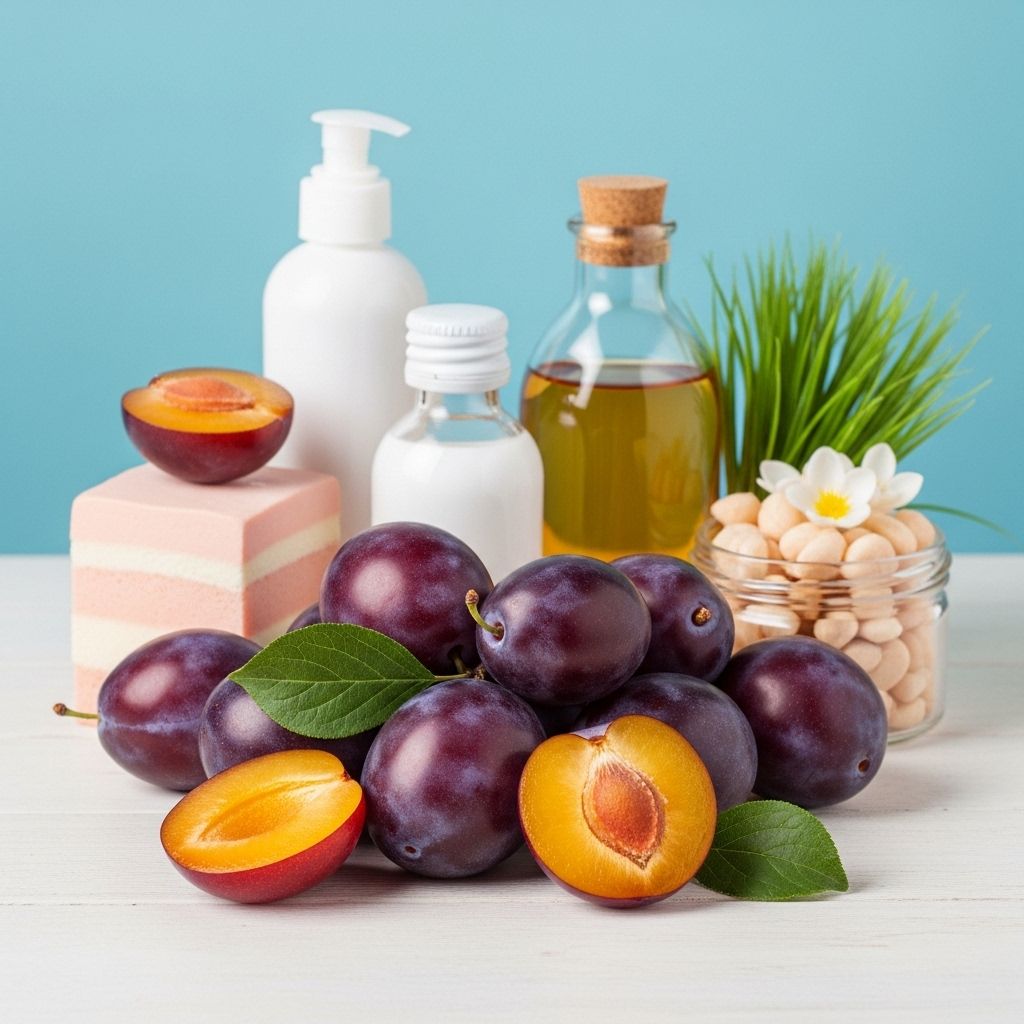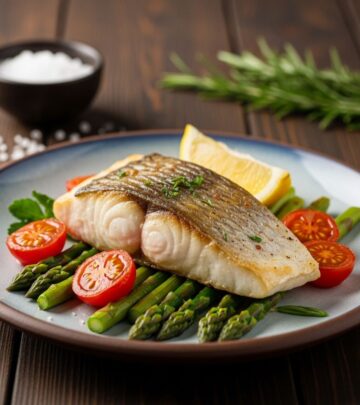9 Ways Plums Benefit Skin, Hair, and Health
A nutrient-packed fruit that supports digestion, strengthens bones, and boosts vitality.

9 Ways Plums Benefit Your Skin, Hair, and Health
Plums are more than just delicious—they’re packed with health-promoting nutrients and plant compounds. From digestive support to heart health and glowing skin, this vibrant fruit offers a broad array of advantages for your overall wellness. Below, explore the key benefits of adding plums to your diet, backed by research and nutrition science.
Table of Contents
- Nutritional Profile of Plums
- 9 Proven Benefits of Plums
- Types of Plums and Ways to Use Them
- Tips for Buying and Storing Plums
- Frequently Asked Questions
Nutritional Profile of Plums
Plums are low in calories, yet rich in essential vitamins, minerals, antioxidants, and dietary fiber. Here’s what you get in an 80g serving (about two small or one medium plum):
| Nutrient | Amount (per 80g) |
|---|---|
| Calories | 29 kcal |
| Protein | 0.5 g |
| Fat | 0.1 g |
| Carbohydrate | 7.0 g |
| Fiber | 1.7 g |
| Potassium | 192 mg |
| Vitamin C | Boosts immunity and collagen |
| Vitamin K | Supports bone and heart health |
| Polyphenols, Anthocyanins | Antioxidant properties |
Plums are especially notable for their high content of plant compounds called polyphenols and anthocyanins—antioxidants that can help protect the body from oxidative damage.
9 Proven Benefits of Plums
1. Plums Help Treat Constipation
Plums and especially prunes (dried plums) are famous for their laxative properties. The fruit’s dietary fiber, sorbitol, and phenolic compounds:
- Promote bowel regularity and help relieve constipation.
- Phenolics and fiber in plums boost gastrointestinal function.
- Prunes improve stool frequency and consistency—sometimes performing better than fiber supplements like psyllium.
This makes plums a gentle, natural way to support digestive health.
2. Plums Aid Diabetes Treatment
Plums contain a variety of beneficial bioactive compounds, such as sorbitol, quinic acid, chlorogenic acids, vitamin K1, copper, potassium, and boron. Together, these may:
- Lower diabetes risk by regulating blood sugar levels.
- Boost serum levels of adiponectin—a hormone involved in blood sugar regulation and insulin sensitivity.
- The fruit’s fiber slows carbohydrate absorption, potentially helping with weight management and glucose spikes.
- May enhance insulin sensitivity, supporting diabetes care.
Dried plums (prunes) have also been linked with increased satiety, reducing overeating and limiting the risk of metabolic diseases.
3. Plums Are Rich in Antioxidants
Plums are considered antioxidant powerhouses. They provide:
- Anthocyanins: Responsible for the fruit’s red, blue, or purple hues, these protect against cell damage.
- Quercetin and chlorogenic acid: May decrease inflammation and reduce risk of chronic diseases.
- Antioxidants in plums help prevent free radical damage, potentially lowering cancer risk and slowing aging.
Plums are particularly rich in these compounds compared to many other fruits.
4. Plums Support Heart Health
Adding plums to your diet may help protect your cardiovascular system:
- Potassium helps regulate blood pressure, while vitamin C, polyphenols, and anthocyanins all support artery health.
- Polyphenols may help relax blood vessels, improving blood flow and reducing the risk of hypertension and heart attack.
- Plums are naturally low in sodium and fat, supporting overall heart wellness.
Regular plum consumption has been associated with reduced risk factors for cardiovascular disease.
5. Plums Promote Bone Health
Research suggests both plums and prunes can strengthen bones and reduce risk of osteoporosis:
- Vitamin K, potassium, and copper are essential for strong bones.
- Plums’ polyphenols help prevent bone breakdown.
- A study found postmenopausal women who ate prunes daily had lower rates of bone loss.
This bone-protective effect appears especially strong in dried plums (prunes).
6. Plums Enhance Skin and Hair Health
Plums are rich in vitamin C and phytonutrients that benefit your skin and hair:
- They support collagen production, vital for supple, wrinkle-resistant skin.
- Powerful antioxidants guard against premature aging and sun damage.
- Vitamin C aids iron absorption, which can help prevent hair thinning.
- Some compounds in plums may reduce the formation of dark spots and stimulate healthy hair growth.
Snacking on plums regularly may support a healthy, radiant complexion and strong hair.
7. Plums May Boost Immunity
Early evidence suggests plums may enhance the immune response:
- Animal studies indicate that plums can strengthen immune defenses and help recover from infections faster.
- Plum’s combination of vitamin C and phytonutrients may improve your body’s resistance to seasonal colds and other illnesses.
More human studies are needed for confirmation, but the nutritional profile supports regular intake to help maintain immunity.
8. Plums May Aid Weight Loss
Plums are naturally low in calories and high in water and fiber, making them ideal for weight management:
- One medium plum contains about 30 calories and almost 1g of fiber, keeping you satisfied longer and reducing overall calorie intake.
- High in polyphenols that may prevent weight gain and support healthy fat metabolism.
- The sweet, juicy nature of plums makes them a great low-calorie snack, curbing cravings for sugary treats.
Incorporating plums into your meals or snacks can help you reach your weight goals.
9. Plums May Aid Fetal Development
Initial animal studies suggest that plum extracts may support fetal bone and tissue development during pregnancy:
- Rich in vital nutrients and minerals crucial for bone formation.
- More human research is needed to confirm these benefits, but plums can be a nutritious part of a balanced prenatal diet.
Pregnant women should consult a healthcare provider regarding the optimal amount to consume.
Types of Plums and Ways to Use Them
There are hundreds of plum varieties, divided mainly into European and Japanese types. You can enjoy plums:
- Fresh as a snack or in salads
- Stewed or roasted for desserts or side dishes
- Blended into smoothies
- Baked into pies, tarts, or muffins
- As prunes (dried plums), which are great for digestion
Be mindful that prunes are more calorie-dense due to water loss and concentrated sugars.
Tips for Buying and Storing Plums
- Look for plums that are slightly soft but not mushy, with a rich color and no blemishes.
- Keep ripe plums in the refrigerator and consume within a few days.
- Unripe plums will ripen at room temperature in a paper bag.
- Dried plums (prunes) can be stored for months in an airtight container.
Frequently Asked Questions (FAQs)
Q: Can plums be eaten every day?
A: Yes, plums are safe and healthy to consume daily in moderation. They offer abundant fiber, vitamins, and protective antioxidants.
Q: Which is healthier—fresh plums or prunes?
A: Both offer valuable nutrients, but prunes have more fiber and some concentrated vitamins/minerals due to dehydration. However, prunes are higher in sugar and calories per serving, so enjoy them in moderation.
Q: Are plums suitable for diabetics?
A: Yes, plums have a low glycemic index. Their fiber and polyphenols help regulate blood sugar, but portion size does matter.
Q: Can plums help improve skin health?
A: Plums contain vitamin C and phenolics that support collagen and protect against free radical damage, promoting healthy, youthful skin.
Q: Are there potential side effects?
A: Plums and prunes have a natural laxative effect and may cause digestive discomfort if consumed in large amounts. People with certain allergies or gastrointestinal sensitivities should moderate intake.
Key Takeaways
- Plums are a tasty, low-calorie fruit packed with antioxidants, vitamins, minerals, and fiber.
- They support digestion, blood sugar control, heart and bone health, immunity, skin, and hair vitality.
- Eat a serving of 2-3 fresh plums or 3-5 prunes per day as part of a balanced diet for the maximum benefit.
- For personalized advice, consult your healthcare provider or registered dietitian.
References
- https://www.bbcgoodfood.com/health/nutrition/health-benefits-plums
- https://www.stylecraze.com/articles/benefits-of-plums-for-skin-hair-and-health/
- https://health.clevelandclinic.org/benefits-of-plums
- https://www.businessinsider.com/guides/health/diet-nutrition/plum-benefits
- https://pmc.ncbi.nlm.nih.gov/articles/PMC11548136/
- https://pmc.ncbi.nlm.nih.gov/articles/PMC5409740/
Read full bio of medha deb












